Climate Lockdowns coming to Quebec? Bill 50 suggests so.
by Dan Fournier, published Thursday, February 8, 11:25 EST on fournier.substack.com
As per a February 1, 2024 tweet by Vue du Québec, a new proposed law in the province of Quebec would entail provisions for emergency measures pertaining to climate change and forest fires.
Bill 50 – An Act to enact the Act respecting civil protection to promote disaster resilience and to amend various provisions relating in particular to emergency communication centres and to forest fire protection – was introduced earlier this year during the 43rd Legislature, 1st Session at the National Assembly of Quebec.
“This bill proposes mainly a new civil protection regime whose purpose is the protection of persons and property through effective disaster risk management and an optimal response to disasters with a view to promoting society’s disaster resilience,”states an introductory explanatory note for the bill.
The bill is sponsored by François Bonnardel, the Minister of Public Security who is also a deputy for Granby for the Coalition Avenir Québec (CAQ), the current ruling party in the province.
François Bonnardel, Member for Granby for the Coalition avenir Québec (CAQ) party and current Minister of Public Security. Photo source: National Assembly of Quebec.
The full 52-page text of the bill (in PDF form) can be accessed here.
The Devil is in the Details
The text of the bill frequently mentions ‘disasters’ (‘sinistres’ in French) and ‘climate change’ (‘changements climatiques’) though specific definitions for these are not provided therein.
‘Risques de sinistre’ (translated to ‘risk of disasters’ in English) appears 32 times in the bill.
Chapter I of the bill, ‘ÉDICTION DE LA LOI SUR LA SÉCURITÉ CIVILE VISANT’ (English: ‘ENACTMENT OF THE CIVIL SECURITY LAW’) suggests that the proposed law is meant to serve as a formal framework establishing “civil security,” measures that would be undertaken in the event of such “disasters.”
Climate change appears to be a strong driver for the introduction of the bill:
“French: « CONSIDÉRANT que le Québec est confronté à une augmentation de la fréquence et de l’ampleur des sinistres, notamment en raison des changements climatiques;
[English translation]: WHEREAS Quebec is faced with an increase in frequency and scale of disasters, particularly due to climate change;”
and
“French: « CONSIDÉRANT que la sécurité civile entretient des liens indissociables et interdépendants avec les autres domaines qui y concourent, dont l’aménagement et le développement durables du territoire, l’environnement, la lutte contre les changements climatiques, la santé et l’économie;
[English translation]: WHEREAS civil security maintains inseparable and interdependent links with other areas that contribute to it, including sustainable territorial planning and development, the environment, the fight against climate change, health and the economy;”
In its February 1, 2024 tweet, Vue du Québec noted the following provisions of the bill which appear to indicate harsh and lengthy measures which could ensue in the event of a “climate emergency” or “disaster,” whatever that may be.
“English translation (via Google Translate), emphasised as per the image:
53. The government may declare a national state of emergency in all or part of Quebec territory, for a maximum period of 10 days, when a disaster or other event disrupts the functioning of the community to the point of compromising security of persons occurs or is imminent and he considers it necessary to resort to the extraordinary powers provided for in article 57 in order to take the immediate actions required to protect life, health or the integrity of people.Before its expiry, the government may renew the state of emergency for other periods of maximum 10 days or, with the consent of the National Assembly, for periods of maximum 30 days, as long as the conditions provided for in the first paragraph are met.”
Provision 53 above states that the provincial government can declare a national state of emergency in any or all parts of the province. And the state of emergency can be extended for up to an entire month.
Moreover, the provision states that the provincial government can resort to “extraordinary powers,” as are stated in clause 57.
“57. During the state of emergency, despite any provision to the contrary, the government or a minister authorized to act within the framework of the state of emergency may, without delay and without formality, to protect the life, health or integrity of persons:
1° order the deployment of measures from the civil security plan of a
local municipality or government disaster response plan and, if necessary, designate the person responsible;
2° order the closure of establishments;
3° control access to traffic routes or to the territory concerned or subject them to specific rules;”
Under a “state of emergency” and during the “deployment of measures from the civil security plan,” an authorised minister or the government itself can readily impose the closure of establishments such as businesses, as was the case during the Covid-19 Pandemic.
In addition, they could block or close traffic roads and highways.
At the end of 2022, it was reported that residents of Oxfordshire in the U.K. would see their automobile travel restricted to specific city zones under the auspices of climate change. As journalist Paul Joseph Watson noted, climate lockdowns are already happening.
As Bill 50 is currently worded, road closures could last up to 30 days.
This could have devastating consequences for individuals and business owners wishing to travel using motor vehicles.
“4° order, when there is no other means of protection, the construction or demolition of any work or the movement or removal of any thing;
5° grant, for the time he deems necessary for rapid and effective measures deployed, authorizations or exemptions provided for by law for the exercise of an activity or for the accomplishment of an act required in the circumstances;
6° order, when there is no other means of protection, the evacuation of people or their sheltering, including their confinement;”
The ordering of the destruction ore removal of private property would be possible, as is stated in point 4 above.
Also similar to confinement experienced during harsh lockdowns and curfews imposed on Quebecers during the Covid-19 Pandemic, the proposed law could force people to “evacuate” in designated shelters or places of “confinement.”
Moreover, It is difficult to ascertain what could be meant by “means of protection.” How would “protection” be defined and by whom? Who would have the authority to determine the reasonableness of its measures?
“7° order to stop the supply of energy or water;
8° request the services of any person able to assist the deployed personnel;
9° requisition the necessary emergency means and private or public accommodation;
10° requisition essential goods and see to their distribution;
11° ration essential goods and services, set their prices and establish supply priorities;”
Point seven above would essentially give the enforcing authorities the ability to cut water supplies and electricity, gas, or other forms of energy to homes and businesses.
Last year in the United States there was already posturing to disallow the use of gas stoves which even certain lawmakers pushed backed on. Moreover, it has generally been seen as an unfounded mechanism to further the climate change narrative and bring out about an outright ban on the use of natural gas for individuals and business.
In addition, point nine appears to give the authorities the means to appropriate private property as a form of accommodation in the case of an emergency.
‘Emergency’ is also not defined in the bill.
For point 11, setting prices of supplies could be viewed as a form of Soviet-era price-fixing, though on the flip side it could also prevent bad actors from over-charging for essential products that could be highly sought during disasters and emergencies.
“13° incur the expenses and conclude the contracts that it deems necessary;
14° implement a general financial assistance program or
compensation established under the first paragraph of section 62;
15° order any other necessary measure.”
To “conclude the contracts that it deems necessary,” is reminiscent of how governments purchased billions of dollar worth of Covid-19 vaccines. Such mammoth deals with private-sector partners could prove not only costly to taxpayers, but also to government coffers which are already quite stretched and for which borrowing costs compound the financial burden.
For point 15, to “order any other necessary measure,” seems quite carte blanche, if you will, in that the way it is currently worded in the bill, it appears to give government authorities to do whatever they want.
Forest Fires used as a pretext for additional power grabs?
In the explanatory notes of the bill, it states [with emphasis added]:
“Par ailleurs, le projet de loi transfère au ministre de la Sécurité publique le pouvoir de désigner un organisme de protection contre les incendies de forêt et élargit la charge de cet organisme à la protection des communautés et des infrastructures stratégiques. Ce faisant, il accorde au ministre le pouvoir d’ordonner toute mesure pour assurer la sécurité publique lorsqu’un incendie de forêt ou qu’un risque d’un tel incendie l’exige, notamment restreindre ou interdire la circulation en forêt ainsi que l’accès à celle-ci et interdire de faire des feux sur le territoire qu’il détermine.
[English translation]: Moreover, the bill transfers to the Minister of Public Safety the power to designate a forest fire protection agency and expands the responsibility of this agency to protect communities and strategic infrastructure. In doing so, it grants the Minister the power to order any measure to ensure public safety when a forest fire or the risk of such a fire requires it, in particular restricting or prohibiting movement in the forest as well as the “access to it and prohibit making fires in the territory it determines.”
The bill clearly states that it intends to both designate a “forest fire protection agency” and grant the Minister – presumably either the Minister of Public Security or that of the new fire protection agency – expanded powers, including imposing “any measure” he or she sees fit.
The concern here is that there is an obvious potential for abuse.
Last summer in Quebec province, many forest fires were ignited by arsonists, yet the phenomenon was largely blamed on climate change.
Could the narrative continue to be pushed to the extent that they could impose restrictions on homeowners who have wood stoves from heating their homes using this energy source?
Provision 11 of the bill seems to indicate the possibility:
“§2. — Persons whose property or activities may be at the origin of a disaster
11. Persons whose property or activities may be the cause of a disaster that the government determines by regulation must collaborate with the municipal authorities in whose territory the property is located or the activities are carried out by producing a risk declaration.”
Since “disaster” is not defined, what is to prevent the authorities from declaring that emissions from the chimneys of homes and businesses who use wood heating stoves contribute to climate change and then ban their use under the guise of a ‘climate emergency’?
Provision 11 from above states that persons must collaborate with their municipal authorities by, including providing “risk declarations.”
Fail to comply in this regard would result in the imposition of hefty fines by wrongdoers, as per provision 87 under chapter 5 of the bill:
“CHAPTER V
CRIMINAL PROVISIONS
89. The following are liable to a fine of $1,000 to $5,000 if it concerns a natural person or of $3,000 to $15,000 in other cases: risk declaration in contravention of section 11;
...
3° anyone who makes a declaration or gives information or a document which is incomplete or which contains a false or misleading statement with the aim of misleading the person who has the right to require it.”
As written, it would appear that the party imposing the fine would have sole discretion in determining whether a person’s declaration contains “incomplete,” “false,” or “misleading” statements. This is subjective at best.
As an illustrative example, suppose a homeowner who has a wood stove to heat his home provides a formal written declaration to his municipality who judges it to be misleading or false, then that could lead to the imposition of a fine of up to $5,000 on that individual.
The Journal de Québec, one of the province’s top newspapers, published an article last month titled ‘À Québec, c’est le temps de déclarer votre foyer ou poêle à bois’ (English: ‘In Quebec City, it’s time to declare your fireplace or wood stove’, archived here).
The article states that as of January 1st, 2024, those who own a wood stove or similar appliance are obligated to declare it to the city by April 1, ironically on April Fools Day.
Of 25,000 wood stoves or appliances that are said to exist in the capital city, only 1,522 have been declared thus far, notes the author of the piece.
Furthermore, the article states that by 2026, the use of wood stoves will no longer be allowed.
“On veut ainsi mieux contrôler les émissions de particules fines polluantes causées par le chauffage au bois,” states the article (English: “We therefore want to better control the emissions of fine polluting particles caused by wood heating.”).
The language is telling. To “control” the “emissions” of “fine polluting particles” can easily be seen as a justification to ban the use of wood stoves that inherently produce such kinds of emission, all in the name of adhering to controls about alleged climate change.
The statement itself is somewhat odd, for it comes from the author of the article rather than a city or government spokesperson.
The Journal de Québec is owned by Quebecor Media, the largest private media player in the province.
Returning to the bill, provision 13 allows for an inspector to penetrate peoples’ homes or businesses for inspection and take photographs of their activities – which appears to be a clear violation of privacy rights and Constitutional and Charter rights both at the provincial and federal levels.
“13. Each local municipality is responsible for ensuring the application in its territory of the regulation made under section 11. For the purposes of verifying its application as well as that of a regulation made under Article 12, it may designate any person to act as inspector. An inspector may, in the exercise of his duties:
1° enter, at any reasonable time, a place where he has reasonable grounds to believe that property is located there or that an activity is carried out there under the responsibility of a person covered by a regulation made under section 11 or section 12 and inspect it;
(2) take photographs of the property or activities of that person;”
During a January 31st press conference, the bill’s sponsor François Bonnardel was asked about this specific provision by a reporter.
Bonnardel replied that it would be the police who could do so with a proper warrant. The reporter then asked if something would be added to the bill to this effect. The Minister of Public Security admitted that we wasn’t entirely certain, as he had a doubt in his mind about the provision and would provide further confirmation to him after the press conference.
It remains to be seen what kind of pushback comes from the general population and from members of competing political parties at the National Assembly of Quebec.
The composition of the the Assembly, as of October 12, 2022 is as follows:
Coalition avenir Québec (CAQ) : 89 seats
Quebec Liberal Party: 21 seats
Québec solidaire : 11 seats
Parti québécois: 3 seats
Addendum
2024-02-08 at 11:55 am: The Journal de Québec has published a February 6 article titled ‘Interdiction d'utiliser des poêles et foyers à partir de mercredi à Québec’ (English: ‘Ban on the use of stoves and fireplaces from Wednesday in Quebec City’) which states that as of yesterday it is forbidden for residents of Quebec City to use their wood stoves under a temporary restriction due to a “deterioration of the quality of the air.”
Those who contravene the restriction can be subject to fines ranging from $300 to $1,000, affirms Pascal Lavoie, a spokesperson for the city.
Template Letter to send to your Depute at the Quebec Assembly sharing concerns about Bill 50
I have created a template letter that you can edit and send to the provincial Deputy of your city or region (click the link to find yours along with his or her mailing and email address) to share concerns about Bill 50.
Microsoft Word format
PDF format
Technical note: there could be difficulties downloading these templates via smartphones. It is thus best to do so via a desktop computer. For the Microsoft Word version (.docx) your web browser may issue a security warning which you can simply acknowledge and proceed to download. Contact me if you have further difficulties.
I have already sent the letter to my own local representative and will await their response.
Most articles are free, but please support the work of this independent journalist by considering a paid subscription to his Substack (for only $5 a month, or $50 a year) and following his Twitter.
Disclaimer:
See the author’s About page for full disclaimer.
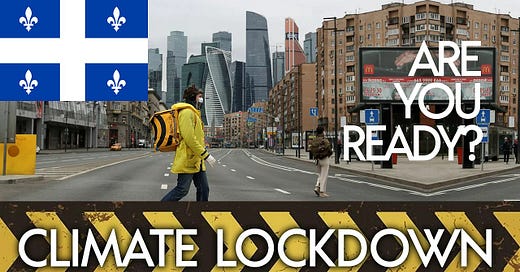





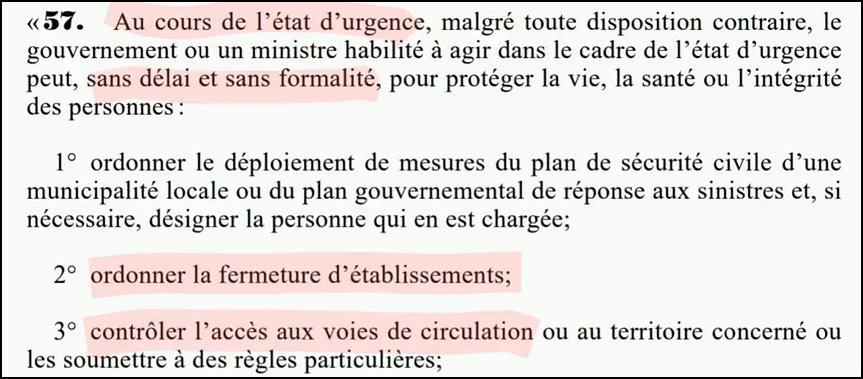
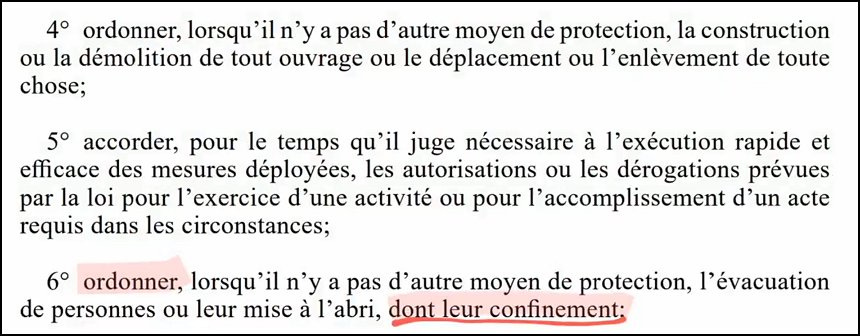
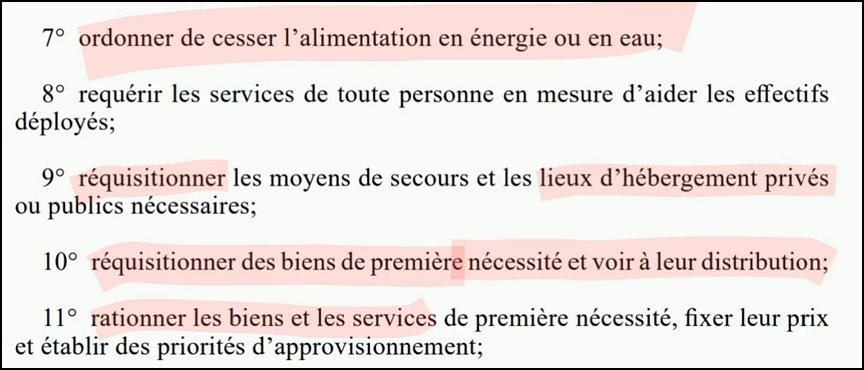

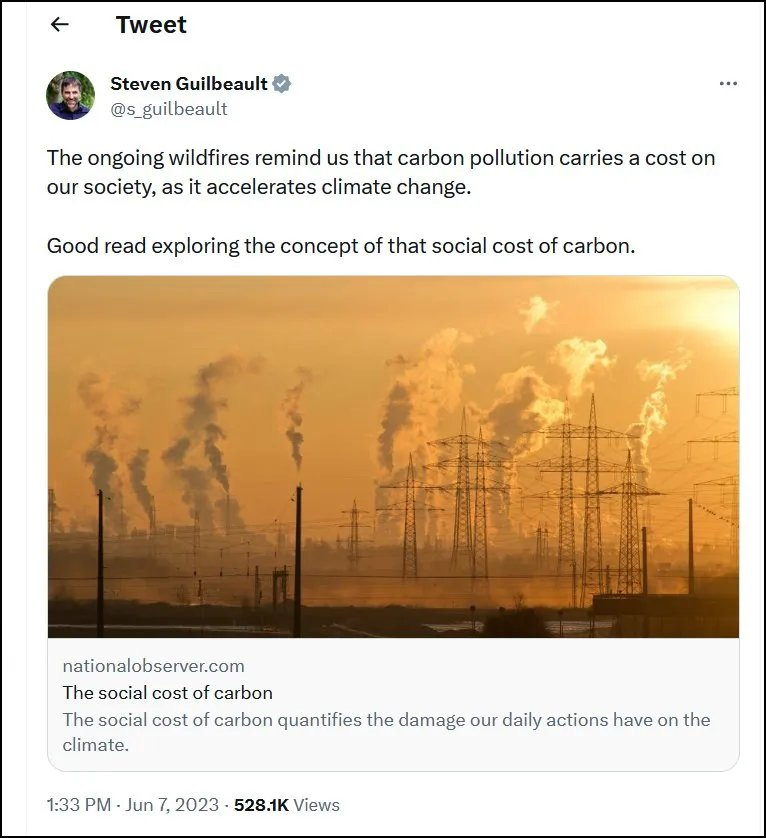

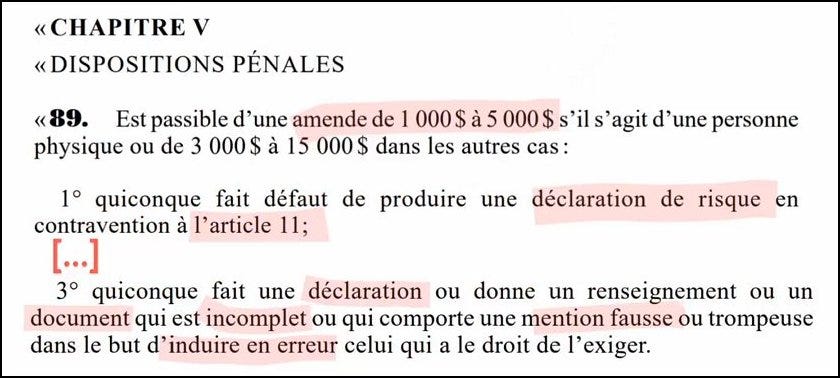
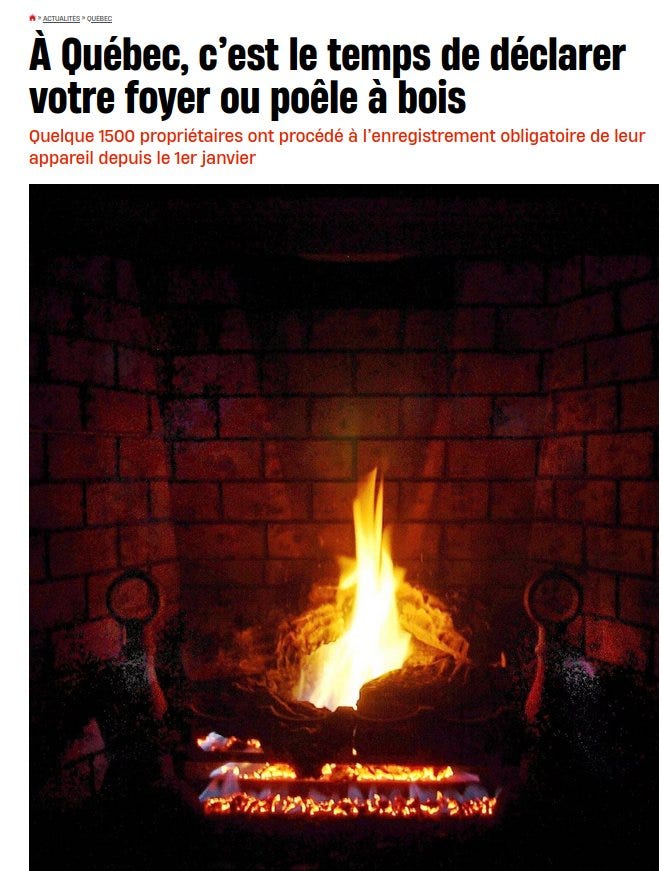
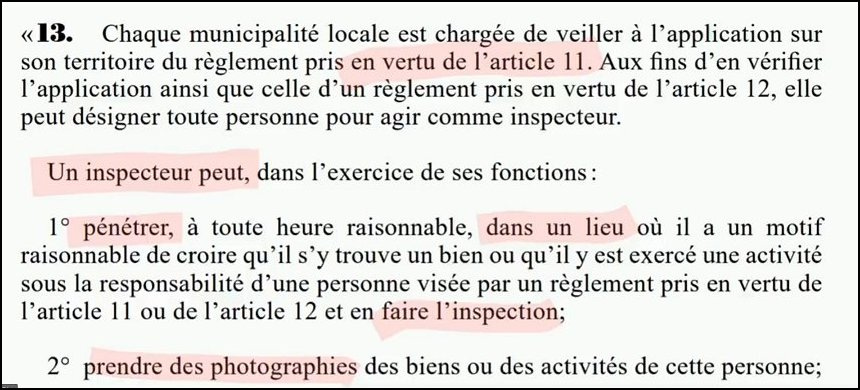



Years of indoctrination and brainwashing will do that to folks. Some in my family too. They refuse to see even if you lay it all cleanly in front of them. Each has to awaken on their own, hopefully before they become an obvious victim.
Unbelievable. It will pass because a) all the parties are on board with the idiotic climate crisis agenda and b) they serve globalist interests.
There will be little pushback because a majority of Quebecers support this and have already shown itself to be an authoritarian and neutered society ready to trade freedom for security.
I tell anyone who can to leave not just Quebec but Canada. I'm investigating preparing my daughter to leave. Her mother and I hope to join her if our plans work out. For now, we're stuck because of our business. But every day our governments in Ottawa and Q-City increase our anxiety to move quicker with their irrational declarations. They're not wrong. They're beyond the realm of wrong now.
Head to the States where there will be a fighting chance to live in peace. But not here. Not with this Pavlovian Dog society.
I hope I'm being dramatic but I don't think so.